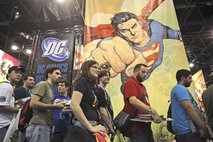
20 Oct 2010 13:57:54
According to CBS News, Richard Turner and an unnamed accomplice attempted to steal some valuable comics from Matt Nelson, co-owner of Worldwide Comics in Texas. Nelson chased after Turner, who had grabbed a copy of "Action Comics #11" valued at $4,000. This particular comic is notable because it contains one of Superman's earliest appearances.
Turned has since been charged with grand larceny and possession of stolen property. The accomplice did run away with a copy of "Whiz Comics," featuring the first appearance of Captain Marvel. Published in 1940 by Fawcett Comics, the book had an estimated value of $11,000 and shows how young Billy Batson first said the magic word "Shazam!"
Pop culture conventions like the ones in New York and San Diego do attract a fair number of con artists and thieves. Three years ago, the San Diego Union Tribune reported that thieves target rare, collectible comics, especially on convention floors packed to capacity. Dealers have to keep a watchful eye on their displays in situations like this.
Captain Marvel and Superman, the two comic book characters entangled in this recent four-color heist, have been in "trouble" with the law before, however.
A popular comic hero throughout the 1940s, Captain Marvel had to hang up his cape in 1953 due to allegations of copyright infringement. DC Comics brought suit against Fawcett, claiming the Captain Marvel character was too similar to Superman.
Twenty years later, DC Comics brought the crimson-suited crime fighter, often referred to as the "Big Red Cheese," out of limbo, testing the waters with a story entitled "Make Way for Captain Thunder." Captain Marvel returned to the comic book rack, this time under the DC Comics banner.
DC Comics also was on the receiving end of a super lawsuit in 1948, this time involving Superman's creatorsJerry Siegel and Joe Shuster, The two creators sold the rights to the character who would become a comic book legend within just a few years. Siegel and Shuster felt they were owed more of the Superman profits, and they took DC Comics to court.
Turned has since been charged with grand larceny and possession of stolen property. The accomplice did run away with a copy of "Whiz Comics," featuring the first appearance of Captain Marvel. Published in 1940 by Fawcett Comics, the book had an estimated value of $11,000 and shows how young Billy Batson first said the magic word "Shazam!"
Pop culture conventions like the ones in New York and San Diego do attract a fair number of con artists and thieves. Three years ago, the San Diego Union Tribune reported that thieves target rare, collectible comics, especially on convention floors packed to capacity. Dealers have to keep a watchful eye on their displays in situations like this.
Captain Marvel and Superman, the two comic book characters entangled in this recent four-color heist, have been in "trouble" with the law before, however.
A popular comic hero throughout the 1940s, Captain Marvel had to hang up his cape in 1953 due to allegations of copyright infringement. DC Comics brought suit against Fawcett, claiming the Captain Marvel character was too similar to Superman.
Twenty years later, DC Comics brought the crimson-suited crime fighter, often referred to as the "Big Red Cheese," out of limbo, testing the waters with a story entitled "Make Way for Captain Thunder." Captain Marvel returned to the comic book rack, this time under the DC Comics banner.
DC Comics also was on the receiving end of a super lawsuit in 1948, this time involving Superman's creatorsJerry Siegel and Joe Shuster, The two creators sold the rights to the character who would become a comic book legend within just a few years. Siegel and Shuster felt they were owed more of the Superman profits, and they took DC Comics to court.

